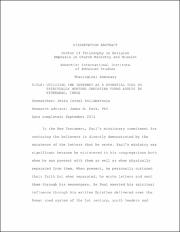| dc.description.abstract | In the New Testament, Paul’s missionary commitment for
nurturing the believers is directly demonstrated by the
existence of the letters that he wrote. Paul’s ministry was
significant because he ministered to his congregations both
when he was present with them as well as when physically
separated from them. When present, he personally nurtured
their faith but when separated, he wrote letters and sent
them through his messengers. As Paul exerted his spiritual
influence through his written Epistles delivered over the
Roman road system of the 1st century, youth leaders and
church administrators can exert similar spiritual influence
bi-directionally using the Internet in the 21st century.
Exploring the history of the Christian church in
general, and the Seventh-day Adventist Church in
particular, reveal the use of media-based communication
through the printing press, radio, television, and
satellite to fulfill the great commission of Jesus Christ.
It also revealed that the ministry through the old and
traditional means always continued while new means and
methods were added. This shows that using the Internet for
spiritual purposes in the 21st century is acceptable,
legitimate, and necessary.
This research examined the perceptions of 263 young
adults, 6 youth leaders, and 15 church administrators in
Hyderabad, India. The results of the survey showed that 95
percent of the respondents were using the Internet. The
pattern of Internet use per day showed that more than 50
percent of their time spent online was for email, social
networking and chatting which indicated that the Internet
is being used as a good tool for building relationships
regardless of educational attainment, gender, age, and
marital status.
The older and married respondents showed higher
perceptions than the young and the single about the use of
Internet for personal spiritual growth and as a tool to
share their faith with others. This study recommends that
seminars and workshops be conducted to create awareness,
clear misconceptions, and to furnish ideas about the
responsible use of the Internet as one of the potential
tools for nurturing the spirituality of the young adults. | en_US |

